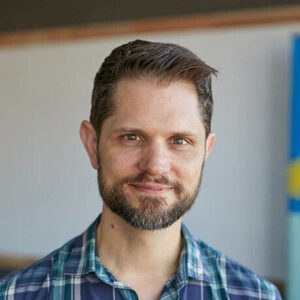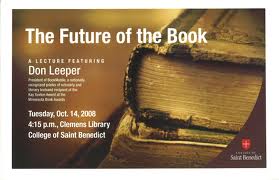Publishing Talks: Interview with Arthur Attwell
February 2, 2021 by David
Filed under Ebooks and Digital Publishing, PublishingTalks, Technology
 Publishing Talks began as a series of conversations with book industry professionals and others involved in media and technology, mostly talking about the future of publishing, books, and culture. I’ve spent time talking with people in the book industry about how publishing is evolving in the context of technology, culture, and economics.
Publishing Talks began as a series of conversations with book industry professionals and others involved in media and technology, mostly talking about the future of publishing, books, and culture. I’ve spent time talking with people in the book industry about how publishing is evolving in the context of technology, culture, and economics.
Some time back, this series broadened to include conversations that go beyond the future of publishing. In an effort to document the literary world, I’ve talked with a variety of editors, publishers and others who have been innovators and leaders in independent publishing in the past and into the present.
These conversations have been inspirational to me on many levels. I have gotten to speak with visionaries and entrepreneurs, as well as editors and publishers who have influenced and changed contemporary literature and culture.
Today’s guest is another such special individual. Arthur Attwell, who lives in Capetown, South Africa, got his start in publishing working for Oxford University Press as an editor. Impatient with the inefficiencies of publishing, he left to start up his current venture with some collaborators, Electric Book Works, which has been building books since 2006 that are active in multiple formats and versions, from beautifully produced print books to well fashioned ebooks to websites that express the book form in new ways.
In addition to the work he has done with Electric Book Works, this energetic entrepreneur has co-created an impactful health care information project, Bettercare, which has created and distributed healthcare learning materials to thousands of practitioners and consumers all over Africa. Although this project, entirely volunteer run, has had to cut back on its activities because of the pandemic, its impact continues with part timers and reduced capabilities.
Perhaps the most exciting efforts I have learned about recently is yet another Attwell project, Book Dash. Arthur and his partners created (and have since carefully refined) a process that assembles teams of book professionals to create and publish children’s books, and which also the raises money and support needed for the printing and distribution of thousands of books across Africa, with the stated goal that every child should own 100 books by the time they are five years old! The Book Dash process was built as an intensive one day effort, gathering teams in person, but has quickly adapted to a virtual model, enabling contributors to participate from multiple physical locations. They have made some really terrific books using this process and Book Dash has now distributed over one million books to children in Africa.
With the time difference between us, arranging this talk required bit of organizing, but we were able to speak recently by Skype. My original goal was simply to give Arthur an opportunity to talk about Book Dash. But we ended up having a much wider conversation on a range of topics, including distributed print on demand printing, a dream concept we both have explored, and much more. I suspect we will talk further in the necessary follow up conversation I hope to have with him as there are so many exciting ideas to discuss.
For now, I hope you will enjoy listening to Arthur Attwell as much as I did.
Arthur’s “On Transit” Talk
Podcast: Play in new window | Download
Publishing Talks: David Wilk interviews Don Leeper
February 14, 2011 by David
Filed under Ebooks and Digital Publishing, PublishingTalks, Technology, The Future
 In this series of interviews, called Publishing Talks, I have been talking to book industry professionals and other smart people about the future of publishing, books, and culture. This is a period of disruption and change for all media businesses. We must wonder now, how will publishing evolve as our culture is affected by technology, climate change, population density, and the ebb and flow of civilization and economics?
In this series of interviews, called Publishing Talks, I have been talking to book industry professionals and other smart people about the future of publishing, books, and culture. This is a period of disruption and change for all media businesses. We must wonder now, how will publishing evolve as our culture is affected by technology, climate change, population density, and the ebb and flow of civilization and economics?
I believe these Publishing Talks conversations can help us understand the outlines of what is happening in the publishing industry, and how we might ourselves interact with and influence the future of publishing as it unfolds.
These interviews give people in and around the book business a chance to talk openly about ideas and concerns that are often only talked about “around the water cooler,” at industry conventions and events, and in emails between friends and they give people inside and outside the book industry a chance to hear first hand some of the most interesting and challenging thoughts, ideas and concepts being discussed by people in the book business.
Don Leeper is the founder of Bookmobile, based outside of Minneapolis, providing outsourced production services to independent and academic publishers all over the world. The company was founded as Stanton Publication Services in 1982, and has grown significantly over the years, now offering not only pre-press services for print books, as well as growing digital printing business, an expanding range of digital book production services, including ebooks and apps, and even an off-shoot business for book distribution. OR Books has hired Bookmobile to provide all of its production services, as some other publishers have also done.
What attracted my attention most recently to this company is their announcement of Ampersand, an iPad app created to preserve the layout and pagination of poetry (and of course any other book for which specific line and page layouts are critical). It’s been one of the raps on ebooks that poetry essentially does not work in the Kindle (mobi) and other popular reading devices or platforms that use ePub as the format for their content. Ampersand enables publishers (and poets who want to publish their own work) to preserve complex page compositions easily and as an app provides both a reading environment and a sales structure on the iPad (and presumably the iPhone and iPod as well).
Clearly Leeper and his crew are creative and working hard to provide a wide range of needed services for independent and academic publishers, for whom the fast changing digital environment presents significant challenges. He’s also a great example of someone who has been agile in moving from traditional publishing workflows into new digital realms while retaining a strong commitment to the important values of design and interface that will always be necessary for writers, publishers and readers, whatever the devices or delivery systems they use for reading.
Ampersand shows alot of promise for many independent publishers of poetry and other types of work where the actual page concept still matters, especially because cost of production matters most for small circulation content (there are certainly other PDF based e-book publishing methods available, but most are more costly and not highly automated). A few poetry publishers are on board with Bookmobile to pilot the Ampersand project, and we’ll be interested to see some finished work in coming months.
In this interview, Don and I had a wide ranging and lively conversation about digital publishing, poetry, and the future of print and ebooks.
![]()
Podcast: Play in new window | Download



